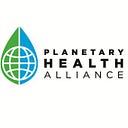Yang Xie Spotlights Sandeep Maharaj
Building a Planetary Health Regional Hub
By Yang Xie, Travel Scholar and Student Ambassador at the 2019 Planetary Health Annual Meeting
Dr. Sandeep B. Maharaj is currently the Director of the Entrepreneurship and Business Transformation Office of the Faculty of Medical Sciences (FMS) at the University of the West Indies (UWI). He is also the Associate Dean for Distance Education, Projects, and Planning for the FMS, UWI, and a Lecturer in Pharmacy Administration. He has nearly 30 publications in international peer-reviewed journals and has presented and attended numerous international conferences. Two of note are the United Nations Congress of Parties 24 in Poland 2018 as a national delegate, and the Health System Global Conference in Liverpool 2018, where he won the Pan American Health Organization Scholarship and was the only researcher from the Latin American and Caribbean region chosen for oral presentation. In the realm of local public service, Dr. Maharaj served as the Deputy Chairman of the Eastern Regional Health Authority, Chairman of the National Health Services Company, and currently serves on the Council Related to Medical Professionals and The National Poison Information Centre Board. Internationally Dr. Maharaj serves on the Caribbean Centre for Health Systems.
I, Dr. Yang Xie, am an associate professor in the health economics and management at Beihang University in China. I earned my M.D. at the Health Science Center at Peking University in China in 2013, my Ph.D. in Public Policy Design in 2017 at Tokyo Institute of Technology in Japan, and have experience in health impact assessments at various scales with over 30 publications in international peer reviewed journals. In my research, I use an integrated platform — which combines an economic computable general equilibrium (CGE) model, air pollutants emission model (GAINS), air quality model (GEOS-Chem) model, as well as health impact assessment model — to quantify the economic impacts of health damages caused by air pollution at the provincial level in China and the health benefits of climate change mitigation globally. This not only provides a rich understanding on how emissions can be reduced, but also enables us to quantify the indirect benefits of air quality improvement and health effects.
Dr. Maharaj and I had a very similar education background given his appointment at UWI’s School of Pharmacy and that I used to be a dermatologist before 2013. We discussed more about the health systems in China and Trinidad and Tobago and talked about the health issues related to air pollution in China and the government’s actions on air pollutants reduction. China has already gotten great achievement on air pollution control so far, but we have to do more about it in the future. We spoke about intensive air pollution policy, which includes reducing fossil fuel combustion, improving the air pollutants control technology, updating the mobile vehicle and developing renewable energy in China. We concluded that while China was the biggest investor in renewable energy technology, their leadership is diminishing and drastic climate change mitigation requires global cooperation.
This was first time I joined the conference organized by Planetary Health Alliance. As the PHA’s Global Outreach Fellow, Dr. Sandeep Maharaj led the Planetary Health Regional Hub satellite session, which convened those interested in developing Planetary Health regional hubs around the world. He encouraged me to join the PHA and contribute more to the Planetary Health in the future. My goal is to encourage my university to join the PHA, which will bring more opportunity to work with other experts globally. I also expect my research team to be a part of Planetary Health Regional Hub. Until the next Planetary Health Annual Meeting!
Live healthily and work for health.
Disclaimer: The views and opinions expressed in this article are those of the author and do not necessarily reflect the position of the Planetary Health Alliance or its members.
